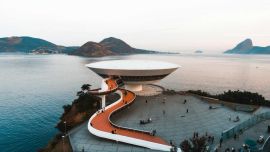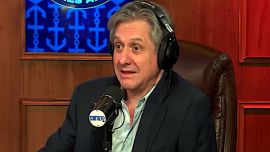"I was, am and always will be Peronist” – the words of Diego Armando Maradona, said as recently as last month on October 17, known more locally as Peronist Loyalty Day.
The phrase, included in a message posted on social networks, saw the Argentine legend summarising his political creed while ratifying his support for President Alberto Fernández and Vice-President Cristina Fernández de Kirchner.
The message, shared with a mocked-up image of Maradona as Juan Domingo Perón, underlined that both Maradona’s parents were Peronist, and that his mother Tota “adored” Evita Perón.
His Peronist loyalties “should not be a problem – the problem is the intolerance towards us,” continued what was to be one of the last political expressions of the controversial football idol, who died of heart failure Wednesday at the age of 60.
Maradona endorsed the Frente de Todos government across the board – as well as the top two in charge, Economy Minister Martín Guzmán, Buenos Aires Province Governor Axel Kicillof and Health Minister Ginés González García were name-checked.
The Gimnasia y Esgrima La Plata coach also used his message to deflect criticisms of his "contradictory" political stances towards different democratic governments.
"Those who do not love me repeat thousands of times that I have supported every political party which has ever governed Argentina. They say that I was Peronist, that I was Radical, that I was neo-conservative. But in reality what I always supported was my country, without caring who governed,” he stressed. “I didn’t go knocking on their doors asking them for a photo, they invited me.”
Loved by millions in Argentina and the world, the football star was a figure sought by all democratic governments across the globe.
Maradona was famously supportive of Cuba’s Fidel Castro, Venezuela's Hugo Chávez and practically every other left-leaning government in the region.
Clashes with Macri
Last month, Maradona renewed his long-running feud with former president Mauricio Macri, accusing the PRO leader of "shitting on the lives of two generations of Argentines."
"I tell you, Mauricio, you did not throw me out [of Boca Juniors]. I left football myself to protect the health of my parents. That was my decision and I didn’t do any harm to anybody. But for all your smoke-bombs you know that your decisions have made the lives of two generations of Argentines shit. Get a grip on yourself, as your own father told you," fired off the footballer.
This latest clash was just one in a series of many and came after Macri said in an interview with Todo Noticias news channel that just as he had “thrown out” Maradona from Boca Juniors football club, so Peronism needed to ditch Vice-President Cristina Kirchner.
In 2015, the football star had rejected Macri’s candidacy, expressing his explicit support for his Frente para la Victoria rival Daniel Scioli, whose great love of sport he shared.
Backing Fernández
His relationship with the Alberto Fernández government was good from the moment that Cristina Fernández de Kirchner announced the Frente de Todos presidential ticket, which would go on to regain power from the hands of the opposition Juntos por el Cambio coalition.
On the day the Fernández-Fernández ticket triumphed, the 1986 World Cup winner tweeted: “Welcome @CristinaFKirchner and @AlferdezOK, we were waiting for you. VAMOS ARGENTINA!!” (note that Maradona thus reversed the order of the presidential slate, while usually respecting it in most of his social network communications).
"This government isn’t Alberto and Cristina, it’s everybody,” he added.
"Diego always accompanied me and I’ll never stop thanking him," Fernández said on Wednesday, after decreeing three days of national mourning.
The balcony with Alfonsín
Maradona entered the Casa Rosada for the first time when he celebrated the 1986 Mexico World Cup triumph from the Pink House’s balconies alongside then-president Raúl Alfonsín and the rest of the national team squad.
The diminutive playmaker also showed his respect for the Radical president when he learned of his death on March 31, 2009, while he was Albiceleste coach, assuring the press that he had received the news "with great sadness."
"When [Alfonsín] became president, I was in Barcelona and the return of democracy to our country was very important," he recalled.
Carlos Menem
Alfonsín was succeeded by Peronist leader Carlos Menem (1989-99), to whom Maradona was close. There are plenty of photos of the two together, but Menem’s policies did not match Maradona’s, the footballer later explained: "We might have contradictions, [what went wrong with] Menem was because they killed his son,” he alleged. “Remember that Menem was against the [national] team and it was I who had to pick up the pieces."
Enmity with Eduardo
The 1999 presidential elections were a rare instance of Maradona opposing the Peronist candidate at the time, Eduardo Duhalde. El Diez favoured the candidacy of Radical leader Fernando de la Rúa heading the Alliance. Maradona was public about his views, stating his preference from Italy as early as November 30, 1998.
But with socio-economic meltdown gathering momentum in mid-2001, the football idol changed his stance, criticising De la Rúa from Havana, where he was undergoing treatment for his drug addiction: "I’d ask the pres’ to wake up. His people need him, I know he’s competent but his nap’s over."
Yet this did not make Maradona like Duhalde any better. "If I saw Duhalde in the desert, I’d throw him an anchovy," was his somewhat bizarre way of expressing his dislike recently.
Admiration for Néstor
From 2003 until his death, Maradona was a public adherent of Kirchnerismo, first supporting the late ex-president Néstor Kirchner from the very start and then his widow, Cristina Fernández de Kirchner, as she took office. "Argentina has lost a gladiator, a man always committed to his ideals and who dug us out of a hole," the sports star told the press on October 27, 2010, when leaving Government House after accompanying the Kirchner family at late former president’s wake.
Cristinista
Years later Maradona did not hesitate to come out in defence of Cristina Fernández, when she had already left the Presidency and was besieged by numerous court cases during the Macri administration’s time in office.
"I know that many people do not like me talking about politics but I want to tell them that today I feel more with Cristina and Justicialism [Peronism] than ever. All my support for Cristina and hang on, La Cámpora," he wrote in a post on Facebook after the first court summons of the ex-president by the late federal judge Claudio Bonadio in the dollar futures case.
2019 campaign
Last year the 1986 World Cup winner backed Frente de Todos throughout the electoral campaign, saying that "Alberto Fernández can count on the support of the entire Argentine people and has zero arrogance."
Maradona has also been policy specific – in September expressed his support for the so-called ‘wealth tax’ now progressing through Congress.
"I ask God that the Solidarity Contribution from Major Fortunes be approved because in these times of crisis we need the help of those who have most. I lost my brother-in-law to Covid-19, and I know what it’s like not to be able to bid farewell to a loved one. I also know what it’s like to have nothing to eat. That’s why I’m at your disposal, president. VAMOS ARGENTINA!" Diego published on Instagram together with an image of his adolescence in Villa Fiorito.
Human rights at home
On the human rights front, Grandmothers of Plaza de Mayo president Estela Barnes de Carlotto said that on Thursday she had woken up hoping that Maradona’s death “had been a bad dream.”
“We Grandmothers only have grateful memories and love towards somebody who always accompanied us with solidarity,” she said in a statement/
“His provocative harangues were always to help us to look for those whom we were missing, for whom we had been looking for 43 years,” said Carlotto, recalling Maradona’s assistance in publicising the campaigns of the Grandmothers to recover the identity of their grandchildren snatched during the dictatorship.
“He hasn’t left us because he’ll remain forever,” said Carlotto.
Maradona “always defended the underprivileged, those who had nothing, he was never an ally of wealth; his heart was always set on remedying injustice, he was not a man bent by personal interests,” she added.
Latin America’s left hails departed legend
Leftist leaders in Latin America offered a heartfelt farewell to Maradona this week upon his death.
Maradona, an unconditional friend of Fidel Castro, Hugo Chávez and Evo Morales, was known for supporting left-leaning governments across the world.
"We have received a very big blow to our life, to our feelings, a devastating blow: the departure of our dear brother Diego Armando Maradona. It is heartbreaking," said Venezuelan President Nicolás Maduro, who described him as "a great rebel."
"He was loyal to our cause, he never hid us, he never denied us," the socialist president, Chávez's political heir, who died in 2013, said on state television.
Maradona was invited several times to Caracas by Chávez (1999-2013) and Maduro, and considered Fidel Castro, who also died on November 25, to be his “second father.”
"Maradona's death hits us on November 25. His friendship with Cuba and especially with Fidel, made him part of this people. The world cries, "Cuban Foreign Minister Bruno Rodríguez said on Twitter.
"Another giant is leaving us," said Nicaraguan President Daniel Ortega, comparing Maradona with Castro.
Former Bolivian president Evo Morales, who once played a friendly match with Maradona in La Paz, at 3,600 metres above sea level, also expressed sadness at the loss of a “brother.”
"With a pain in my soul I have learned of the death of my brother, Diego Armando Maradona. A person who felt and fought for the most humble, the best footballer in the world," Morales said in a tweet.
New Bolivian president Luis Arce also regretted the death of the Argentine star, calling it an “irreparable loss.”
– TIMES/AFP/TÉLAM/NA


























Comments